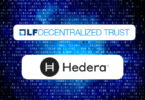Yesterday, The Coupon Bureau (TCB) announced that it is adopting the Hedera Consensus Service (HCS) from distributed technology organization Hedera Hashgraph to enable a tamper-proof log of coupon redemptions on its platform. TCB is a non-profit, industry managed platform that connects manufacturers, retailers, and consumers for coupon data exchange.
While coupons are used by consumer product goods (CPG) manufacturers and retailers to attract customers, due to the wide distribution of coupons, it is difficult for retailers and coupon issuers to keep track of redemptions. TCB, whose advisory committee includes members from Target, General Mills and GS1, works with coupon issuing brands to develop solutions to prevent fraud and track coupon use.
When brands issues coupons, they add them to the Universal Positive Offer File. Consumers present the coupon at the checkout, and the point of scale scans the identifier (GTIN) and updates the Positive Offer File with the redemption.
Using HCS, the coupon registration and redemption is validated in real-time. Apart from fraud prevention, it will enable greater and more timely transparency for brand owners.
Earlier this year, Hedera released its consensus service, which is capable of being used by external centralized applications and other blockchains. A distributed ledger’s consensus is the process that orders and timestamps a series of data often as hashes or digital fingerprints of data held elsewhere.
“The Coupon Bureau is doing important work to provide the industry with connectivity to a shared database that will house all distributed, serialized coupons available for redemption,” said Brandi Johnson, CEO of The Coupon Bureau. “TCB’s platform will enable real-time validated, retailer agnostic manufacturer coupons to support smarter and more strategic campaigns, mitigate fraud, and simplify the redemption and reconciliation processes.”
TCB has an ambitious goal and aims to have a connected retail store within 5 miles of any consumer inside the United States within 12 months of deployment of its system.
“Approximately 250 billion coupons are issued in the US annually, many through different providers, allowing consumers to redeem multiple versions of the same offer and costing brands millions of dollars,” said Mance Harmon, CEO of Hedera Hashgraph.
Hedera Hashgraph is not a blockchain, but a hashgraph focused on enterprise-grade solutions. It is a public distributed ledger technology (DLT) and has some big names, such as Boeing, Deutsche Telekom, Google, IBM and Nomura on its governance board.
Meanwhile, some other efforts to bring the traditional coupons on a blockchain include Fujitsu, the Coupon Chain and LiberActa.
Rewards is a popular blockchain application, with Amex adopting the technology as well as several airlines, including Emirates, Singapore Airlines, Cathay Pacific, and AirAsia.






